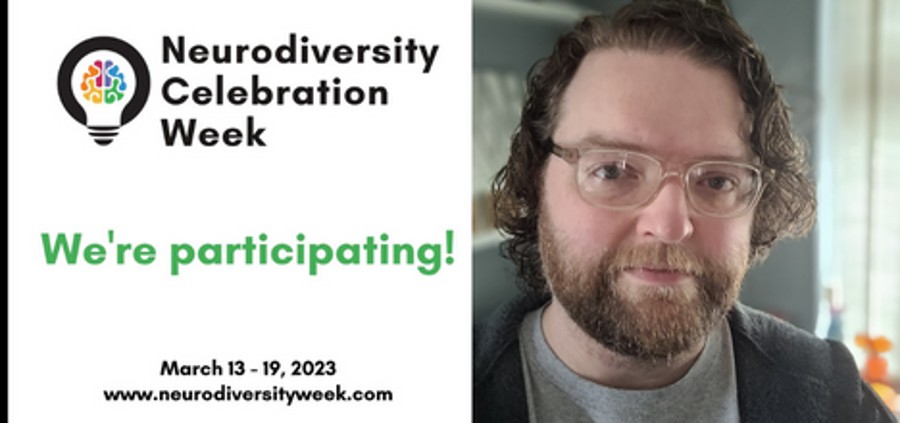Celebrate neurodiversity this week

Lecturer Alan Jack is inviting staff and students to join the University in celebrating Neurodiversity Week, which runs from March 13 to 19.
The national campaign carries the tag line 'Celebrating different minds' and will feature more than 20 free virtual events focusing on ''different mind types'' such as dyslexia, autism and ADHD.
Alan, a Lecturer in Games Design, was diagnosed with ADHD with autistic traits in his late thirties and credits the diagnosis with transforming his life. Alan said: "Before I was diagnosed I had a history of social and mental health problems. I was struggling with people telling me I could be a good student if only I'd apply myself, that I could be a good employee but I came across as unprofessional at times. I'd heard of ADHD and autism but I had never considered that I might have them.
''I'd tried everything and needed answers, which I've since learned is typically when people seek a diagnosis. People tell you that you should be making lists, writing things down but, when you are neurodivergent, it's very hard to form habits and structures. Your brain will oppose these things and it impacts how you see things. So, the processes that everyone is telling you will fix things might work for a day or two but that list will fade away with everything else.
''There's an awful lot of things that are embedded in our neurodiversity that society actually takes as a judgement of character. So, I'd get upset at myself for 'messing things up' and I had been on and off medications for mental health problems. Then I struck lucky in my diagnosis and the amazing subsequent care I received.
''I was immediately put on medication and was nervous that I would have a weird mind-altering experience. Instead I just found myself dusting for about 15 minutes and then crying at the realisation that I'd felt like cleaning and had just done it. There was none of the usual internal monologue about it, judging it. It was incredible. For many people there's no medication, and generally not anything they can do, but a diagnosis is incredibly important nevertheless as it means you can finally forgive yourself.
Alan continued: "I teach Game Design, which attracts a high number of neurodiverse students, and I hope that by being open about my ADHD I can help them.
"I'm glad the University is supporting Neurodiversity Celebration Week as neurodiversity embraces the differences in how we all process things. At Glasgow Caledonian we care so much about our students. We all want to help them grasp every opportunity but sometimes that can mean we are trying to help them become something they are just not born to be.
''I hope this week will inspire us all to realise that so many of our students can do wonderful things if we embrace who they actually are. They may not make eye contact or ever be comfortable speaking in front of others but perhaps they will be the person who writes the incredible, creative presentation that someone else can present. It's so hard to live in a world that isn't designed for you and we need to understand and celebrate that we are all different."
Glasgow Caledonian offers a wide range of support for our neurodivergent students and staff and The Student Wellbeing Service was the UK's first to be awarded National Autistic Society Accreditation in recognition of its pioneering support. Much of that work is now informing the support offered at universities across the UK and Europe.
Catriona Mowat, Disability Manager, said: ''The University is rightly proud of our reputation for good practice in our support of neurodiverse students. To maintain our National Autistic Society accreditation we have to demonstrate that we're continuing to develop our knowledge and understanding of the needs of autistic students and that we're continuing to review our approach, evaluate its impact, and innovate to meet changing demands.
''We've seen significant increases in the numbers of students disclosing autism and ADHD over the last few years. We can draw a lot of positives from that. It suggests that Higher Education is genuinely becoming more accessible and that more young people are receiving a diagnosis at a younger age. It's indicative that there's generally a better understanding and acceptance of neurodiversity in society.
''It also presents some challenges for us of course, in how we support increasing numbers of students. We can only do that with an accelerated shift to inclusive practice, which anticipates potential barriers for neurodiverse students and removes them at design stage. By doing this, we'll reduce the need for individual adjustments and personalised support for neurodiverse students. This shift requires the whole University community to have an understanding and acceptance of the needs, and strengths, of our neurodiverse students and colleagues, and to consider this in everything we do. Celebrating neurodiversity this week is one small step towards this goal that we can all participate in.''
You can find out more about how the University supports our neurodiverse students by following this link and find guidance for staff on accessible and inclusive teaching practices by following this link.
Neurodiversity Celebration Week was founded in 2018 and more than 2,600 schools, 200 universities, 1.4million students, 1,200 organisations, and 150 charities from around the world have pledged their support for the campaign. More than 70 speakers have been lined up to share their lived experience and professional expertise. Learn more and sign up for events by following this link.
